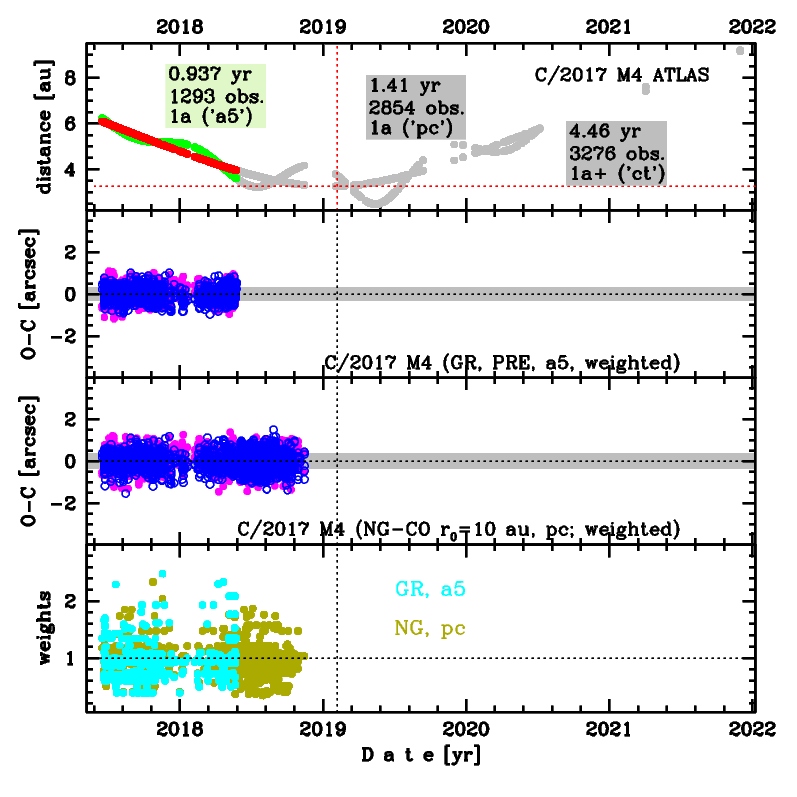C/2017 M4 ATLAS
more info
Comet C/2017 M4 was discovered on 21 June 2017 by Asteroid Terrestrial-impact Last Alert System (ATLAS) Team, that is about a year and 7 months before its perihelion passage. Some prediscovery images of this comet were found: taken on 16 June 2017 by Pan-STARRS 1 telescope (Haleakala).
Solutions given here are based on data spanning over 4.46 yr in a range of heliocentric distances: 6.09 au – 3.252 au (perihelion) – 9.19 au.
NG orbits using full data-arc as well as independently using pre-perihelion and post-perihelion data are determinable.
See also Królikowska and Dones 2023.
| solution description | ||
|---|---|---|
| number of observations | 1293 | |
| data interval | 2017 06 16 – 2018 05 24 | |
| data arc selection | data generally limited to pre-perihelion (PRE) | |
| range of heliocentric distances | 6.09 au – 3.95au | |
| detectability of NG effects in the comet's motion | comet with NG effects strongly manifested in positional data fitting | |
| type of model of motion | GR - gravitational orbit | |
| data weighting | YES | |
| number of residuals | 2552 | |
| RMS [arcseconds] | 0.32 | |
| orbit quality class | 1a | |
| orbital elements (heliocentric ecliptic J2000) | ||
|---|---|---|
| Epoch | 2019 02 06 | |
| perihelion date | 2019 01 18.18587232 | ± 0.00032923 |
| perihelion distance [au] | 3.25169949 | ± 0.00000552 |
| eccentricity | 1.00233052 | ± 0.00000178 |
| argument of perihelion [°] | 167.622770 | ± 0.000080 |
| ascending node [°] | 65.867236 | ± 0.000017 |
| inclination [°] | 105.657661 | ± 0.000003 |
| reciprocal semi-major axis [10-6 au-1] | -716.71 | ± 0.55 |

Upper panel: Time distribution of positional observations with corresponding heliocentric (red curve) and geocentric (green curve) distance at which they were taken. The horizontal dotted line shows the perihelion distance for a given comet whereas vertical dotted line — the moment of perihelion passage.
Middle panel(s): O-C diagram for a given solution (sometimes in comparison to another solution available in CODE), where residuals in right ascension are shown using magenta dots and in declination by blue open circles.
Lowest panel: Relative weights for a given data set(s).
Middle panel(s): O-C diagram for a given solution (sometimes in comparison to another solution available in CODE), where residuals in right ascension are shown using magenta dots and in declination by blue open circles.
Lowest panel: Relative weights for a given data set(s).